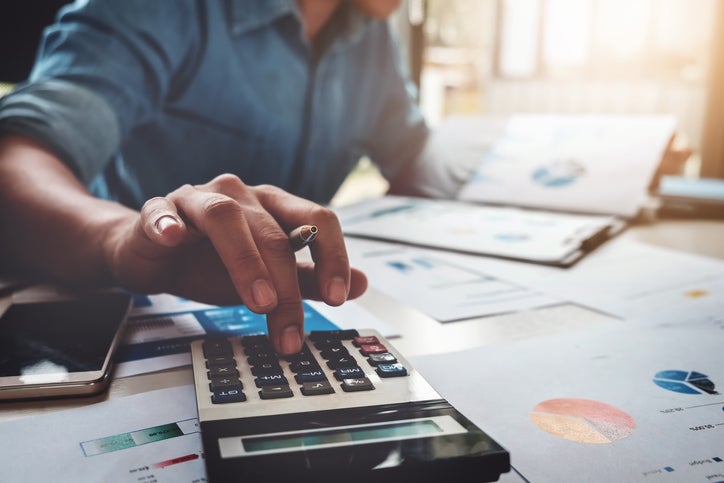How to determine your SME's value
*Updated March 4, 2024
Wondering how to value your business but not sure how to go about it? Valuating your company can be beneficial to your growth. Plus, It can help you understand how to better your businesses' financial situation too, which is useful when it comes to admin like renewing your business insurance.
This helpful guide from Bionic will clear up any confusion and teach you how and when to value your business.
What is a business valuation?
A business valuation is a way of estimating how much money your business is worth. Most business owners carry out a valuation to understand how to increase the worth of their SME, usually before putting it up for sale.
If you’ve put lots of effort into making your business a success, it’s rewarding to see that pay off if you find your company is worth more than you thought. On the other hand, if your business isn’t as valuable as you expected, it gives you room to make improvements in the future.
Ideally, as a business owner, you want to see a valuation figure that doesn’t sell the business and its assets short. However, the valuation also shouldn’t overstate what the business is worth.

Why value a business?
There are many reasons why business owners choose to have their SME valued. Some of them include:
- To help buy or sell a business — Potential buyers will want to know what kind of financial situation your SME is in before they make an offer or express serious interest.
- To create an internal market for shares — Your staff may be interested in buying shares in the company but might want to see how much it is worth first.
- To raise equity capital for shares — You might want to see how much your business is worth for security purposes.
How do I get a business valuation?
Arranging your first business valuation can be daunting. But it's not as hard as it seems. There are a few things to consider but once you’ve wrapped your head around the different ways you can value your business, you should be well on your way to understanding your company’s worth.
These are the main ways to value your business:
1. Asset valuation
Asset valuation is simply checking how much your business assets are worth. When speaking about ‘assets’, there are two different types in business: tangible and intangible.
- Tangible assets are the physical things belonging to your business, such as your premises, stock, land, and equipment.
- Intangible assets are any non-physical additions to your business. These can be things like your brand, reputation, intellectual and copyright.
To get the value of your business via asset valuation, all you need to do is add the worth of your tangible and intangible assets together. Then subtract any business liabilities — things like debt and any owed credit — and you’ll end up with a good estimate of your company's worth.
As a general tip, make sure you keep a record and regularly update information on your assets. Their value may change due to things like inflation so it’s good to keep an eye on what your business owns and its worth.
2. Discounted cash flow
The discounted cash flow method is a way to value your business based on income.
It’s usually used by bigger businesses that have predictable cash flow but if this method appeals to you then try it out.
All you need to do is apply a discount interest rate (this will usually be between 15% to 25%) to cover risks like unexpected bills or things going wrong, and the time value of money.
When we talk about ‘the time value of money’, we mean the idea that £1 earned today will be worth more than the same amount made tomorrow due to earning potential.
To get your estimated business valuation, simply add your projected takings forecast for the next 15 years and add a residual value. If your estimated business valuation is higher than today's number, then your business is likely a good investment.
To find out your company’s growth rate, just compare your previous year’s cash flow with earlier years. For example, if your business cash flow was $25 million in 2023, compare that number to the cash flow in 2022 and see how much it grew.
3. Industry practice
Businesses in different industries are worth different amounts and some sectors buy and sell companies more than others.
It's best to do some research into your own industry before valuing your business. Then you can see how similar businesses assess their own worth. Your own sector might have some specific rules or useful tips to share. For example, the retail industry works a little differently, businesses are valued on business turnover, how many customers it has, and any outlets it may have.
4. Entry valuation
Evaluation means working out how much your business is worth based on if you were to start from nothing.
The vital question asked in an entry valuation is: ‘If my business didn’t exist, how much would it cost to start it up this minute?’
You can estimate your company’s value this way by creating a list of things you’d need if you were creating your business from scratch.
A good tip is to consider things like your business premises, tangible assets, employing staff, building a customer base, and getting products to sell.
Once you have this list written up, consider how you could save as much money as possible when setting up.
After working out all your potential savings, all you need to do is subtract these savings from your start-up costs. Then you’ve successfully worked out the value of your business based on entry valuation.
For example, if you worked out it would cost £6,000 to set up your business from scratch, then subtracted £1,000 in realistic savings you could make, you've then worked out your business is valued at £5,000.
5. Comparable analysis
A comparable analysis is a quick and simple way to value your business. Simply research a business similar to yours that has recently been sold and assess your own worth using the other company as a guide.
How can I prepare my business for a valuation?
When it comes to preparing your business for a valuation, there are a few crucial things you’ll have to consider.
Gather and organise all the relevant data
For a valuation to be performed, you’ll first have to make sure that everything is in check.
Gather and organise all data that gives a snapshot of how your business is doing financially. This can include:
- Financial statements
- Tax returns
- Balance sheets
- Industry benchmarks
You’ll also need to make sure that you have a clear, concise and realistic business plan that outlines your company’s goals, projections and strategies for the future.
You should also be prepared for any questions or assumptions thrown your way. Make a list of potential questions you could be asked and what your response would be.
Tidy up your business records
Picture your business records like a desk cluttered with papers — you need to have them organised!
Take all of the financial documents and any other important records you have, such as contracts, legal agreements and customer data, and get them all in sorting order.
Analyse your operational performance
Next, you’ll need to take a closer look at how your business is doing. Go deep into the numbers and make sure to consider:
- The revenue you’re bringing in
- The profits you’re making
- How much it costs to acquire new customers
- How many of these new customers are sticking around
- Look how your business has performed over the years and spot any trends or patterns
Understanding where your business is financially is key to preparing for a valuation.
Plan for the valuation process
Now that you’ve finally got your ducks in a row, it’s time to plan for the valuation process.
Figure out which valuation methods make the most sense for your business — whether looking at similar companies in the market, assessing your income potential or valuing your physical assets — knowing which can be a big help!
If you’re still unsure about the right process for your business, consider bringing in some expert help, like Valuation Services from chartered accountants.
How can a valuation help my business?
A business valuation can really help you understand your financial situation. If you know how well your business is performing and how much it’s worth, you’ll be able to make better financial decisions in the future.
Plus, a valuation will help bring to light any improvements you need to make to allow your company to shine.
A business valuation can also help when:
- You’re trying to secure an investment — If you’re planning to invest, many investors want to see an actual figure representing the company’s worth before they consider putting money in. Find out more in our guide to finding the right investor for your business.
- Planning to expand your business — If you’re looking to expand, an annual valuation might help you secure funding for planned works.
- Setting a price for employee shareholders — If your employees want to buy and sell shares in the company, they’ll likely want to know how much it’s worth.
- Arranging a business partnership: Most potential partners want to see how well a business is doing before they part with any money.
- Filing taxes — If you’re filling in a company tax return, you might need a valuation number to give them.
- Looking for insurance options — When it comes to insurance, having the right cover in place is crucial for protecting your business. Whether you’re looking for property insurance, public liability, business interruption or anything else in between, a valuation can provide an accurate assessment of your business's value. In some cases, insurers will require a valuation to tailor policies to your specific needs.
Why are business valuations important for insurance?
When you’re looking for business insurance, insurance companies use valuations as a key factor when assessing the risks of insuring you.
Essentially, in the context of insurance, valuations serve as the foundation for determining the amount of coverage you’ll need and the premium you’ll have to pay. An accurate valuation means you won’t be over or underinsured and provides peace of mind that your business has the proper insurance in place should the worst happen.
Does anything affect a business valuation?
There are some parts of a business you can value easily, like tangible assets, your premises and stock. But, intangible assets can be a little harder to value. When determining how much your intangible assets are worth, you should look at:
- How valuable your customers are to the business- If you have loyal customers who love your brand, it’s easier for a new buyer to continue those relationships rather than start attracting customers from scratch.
- The reputation you have built up as a business- If your business has good connections with suppliers, employers, and customers, it makes a real difference. A business is less risky if it has a positive reputation, as the groundwork is already there.
- Any trademarks you have as a business- Trademarks can be real assets as they demonstrate your business is recognisable and has its own branding.
- The circumstances surrounding the valuation - A business having a forced valuation because of money issues — such as a forced sale due to debt — is more of a risk to take on than an SME in a good financial position.
- The strength of the team behind the business- A great team can really propel a business forward to success, if there is a lot of staff support, this acts in favour when a potential buyer is looking into your SME.
- The age of your business- An older, more established business is usually considered less risky to take on compared to a younger business with new customer and staff relationships. If your business is a startup, this has to be considered by any potential buyers. Statistics show as many as 90% of startups fold within 10 years.
- The products you sell or the services you offer- If potential buyers believe in your business and the products you sell, they are more likely to be passionate about making the business work long-term. This is why it helps to try and market your business to the right buyer.
How often should I reevaluate my SME’s value?
Deciding how often to reassess your SME’s value can be confusing, but it’s all about staying in tune with what’s happening.
While there’s no set time that you should reevaluate your business, there are a few things you can keep in mind:
- Market conditions — If your industry experiences rapid changes or lots of economic fluctuations, it might be a good idea to reassess your business's value when these occur. Industries with volatile market conditions, like the energy sector, may require quarterly or semi-annual evaluations to ensure you’re keeping up with the latest trends and developments within your industry.
- Business milestones — Whether you’re launching a new product, entering into a partnership or experiencing significant growth, major milestones within your business can impact its value. If you've been hitting these milestones left, right and centre, it could be a good idea to consider reassessing your business’s value to reflect any changes in its financial performance or market position.
- Financial performance — Fluctuations in revenue, profits or expenses can affect the value of your small business. Making sure that you’re regularly monitoring your financial performance and doing evaluations annually can help you track your progress and identify any new areas for improvement!
What’s the difference between valuation for insurance purposes and valuation for selling my business?
When we break it down, there are four different areas that we can focus on when it comes to differences between valuation for insurance purposes and valuation for selling a business.
These are:
- Focus
- Methodology
- Objective
- Outcome
Valuation for insurance:
- Focus — When you’re valuing your business to renew or take out a new insurance policy, the main focus might be determining the replacement cost of your assets and ensuring you have the right cover in place to reduce against potential risks and losses.
- Methodology — When it comes to incorporating a methodology into your insurance plans, the emphasis is usually on the cost approach. This is to calculate the amount it would take to replace your assets at the current market price, taking into account things like depreciation, market trends and the cost of similar assets.
- Objective — It’s always important to remember why you’re valuing your business. For insurance, it might be to enusre your business is adequately covered if you need to rebuild your bakery shop after a fire or replace assets if someone damages or steals them.
- Outcome — The valuation report should go into detail about the total insurable value of your business assets, including property, equipment, inventory and other tangible assets.
Valuation for selling your business
- Focus — When you’re valuing your business for sale, the focus will shift. You’ll assess its overall worth in the marketplace, including its potential for generating future income and its tangible assets like brand reputation and customer relationships.
- Methodology — Valuation methods are a little different for selling a business compared to insurance options. For selling, it will typically look at three different methods: income approach, market approach and asset-based approach. These factor in things like revenue, profits, growth aspects, market comparables, and intellectual property.
- Objective — The objective for valuation to sell your business is to determine a fair market value that reflects its truth worth to potential buyers. Consider things like future earning potential and tangible and intangible assets.
- Outcome — The valuation report you’ll receive for selling provides an estimate of the market value of your business as a whole. This can help guide negotiations between potential buyers and ensure you receive a fair price for your investment.
How much is my business worth?
You never want to sell your business for less than it’s worth, but you want to avoid trying to sell it for more than it’s worth too.
Trying to price up your company can be a balancing act, but valuing a business can help you focus on areas for improvement. There are lots of things you can do to help get the most out of your valuation, these include:
- Planning ahead - It’s important to have a proper business plan and know your goals for the future.
- Get advice - Sometimes valuing your business can seem like a huge task, but there is help if you’re feeling overwhelmed. Search for a qualified accountant and they can get you off to a great start.
- Think about your processes - Have a real think about how you store company information like financial records. Also, take a minute to consider how your business works and what its strengths and weaknesses are.
- Negotiate - Tangible assets are straightforward to measure, but it’s your own responsibility to promote intangible assets to potential buyers. A good customer base and a catchy brand can be invaluable and worth a lot more than you think.
- Make sure finances are in order - Before you start looking into having your business valued, make sure your finances are in good condition. Be sure to have important documents like profit and loss statements, tax returns, records of purchases, licenses, deeds and any premises correspondence kept together.
- Reducing risk - Calculate risks and try to minimise them as much as possible. For example, if you only use one specific supplier, try branching out to avoid putting all your eggs in one basket. Then you’re protected should there be a supplier problem with your stock. It’s important to periodically take stock of your business and its unique needs. Valuating a business can help do this and focus your mind on where it’s heading. You can learn a lot to prepare for financial decisions in the future, but what works for some companies might not work for your business. So do your research and adapt to your own needs.
Get your business set with Bionic
Whether you’re selling your business or looking for a more comprehensive business insurance policy, you’ll want to make sure that your company has everything in order.
At Bionic, we can help with a wide range of insurance needs, from Broadband to Business Energy, Electricity, Secured Loans and more, we’ve got you covered. Get in touch with us today on 0808 253 9101 or start a quote online.
For all things business, check out our business essentials guides.







